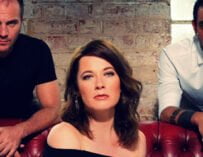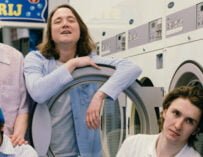Using his custom DAW set-up, this South London-based artist/producer dug deep into his relationships to write this arresting electronic number
Though, of course, we don’t have anything against stand-alone songs, we must confess that we have a soft spot for songs that come together to form something larger – it’s probably the reason why we still prefer to listen to a whole album rather than shuffle our way through life. That’s just one of the reasons why we’re such big fans of Quinn Oulton, a South London-based vocalist, multi-instrumentalist and producer whose upcoming album, Alexithymia, brings together elements of different relationships to tell a single compelling story.
One chapter in that story is new single Better. A soulful piece of electronica that’s underpinned by Oulton’s jazz roots, it has a pulse and rhythm to it that ebbs and flows like any human connection does over time. Here, we enter its creator’s world on a journey of sonic discovery…
More ‘Song Deconstructed’ features
INSPIRATION
The concept and inspiration for the album arose from the same situation that a lot of people found themselves in at the beginning of 2020. Lockdown had just started, and I’d been struggling to come to terms with aspects of my mental health that I’d been able to ignore for a very long time. I’d also just finished building my garage studio, which gave me the space to start this new project.
Alexithymia is the inability to recognise and process your own emotions, and it can impact you both physically and mentally. It’s something that I’d been struggling with for a long time without realising, until I started to see a therapist (which is something I think everyone should do if they have the opportunity, and shouldn’t be a taboo topic). The writing process of this album allowed me to look back into my past to times when I had not been able to acknowledge what was going on emotionally, and try to unpack them. It was actually a really effective way to start working on this aspect of my personality, and I’m so glad that I persevered with it.
LYRICS
Each song is set around a part of my life that I’d struggled to process at the time (involving myself, family, friends, partners etc.), and tied together as if it were a linear story set around a single romantic relationship. I don’t want to get into specific details of the circumstances for each song because I like the idea that they can resonate with listeners in their own way.
With the song Better, I wanted to give off an overly dramatic sense of jealousy and self-pity, set around a narrative of unrequited love. Even though the song was based around my own experiences, I wanted to try writing as if it was someone else’s story – a sort of caricature of myself. This wasn’t something I’d ever done before.
My previous writing had been much more thematically ambiguous. Here, I wanted it to be as clear as possible, with the protagonist showing a sense of self-importance – “maybe all you really need is someone like me”, “besides what’s best for you is nice for me too”.
Melodically, this song was very sparse, and I spent a really long time trying to choose the right words – especially in the beginning of the verse where it’s so syllabic. I seem to have a strong sense of which vowel sounds should be where in phrases, before I know what I want to say. It’s great when I can make it work, but in this case, it made it so much harder to write with very specific syllables and vowels with so few words.
MUSIC
I tend to start with a musical idea most of the time, probably because I started as an instrumentalist, and only got into songwriting in the last five years.
With Better, it was the verse chords, along with that McCoy Tyner-esque, quartal chord movement that happens every four bars. I often like to put a little moment of harmonic interest like that to break up a more simple and approachable base layer of harmony. This definitely stems back to growing up as a jazz musician, and absorbing all the rich detail that exists in that music. I love seeing how small parts of that can be distilled into a songwriting context, and how it can be disguised so as not to feel jarring to listeners who aren’t used to that kind of thing.
The pre-chorus came about by pretty much throwing hands down on the keyboard and seeing what came out, and following my ear. I don’t actively practise piano, which means I often find myself using a lot of the same chord voicings. This can feel frustrating, but on the other hand, it can also help to create a recognisable sound.
For the chorus, I went through a few variations of chords. Initially, it was based around a minor progression like the verse, but it felt too soulful and a bit cheesy. I went for that big open C major chord at the beginning of the chorus which really helps release the tension of all the harmonic movement before it.

Quinn Oulton: “Even though the song was based around my own experiences, I wanted to try writing as if it was someone else’s story.”
IN THE STUDIO
Reaper is my main DAW – I’ve tried basically everything else and I always come back to it. Once all my custom key bindings and mouse modifiers etc. are set up (you can customise literally everything) my workflow is 10x faster than everything else. I have mine set up as a sort of Pro Tools/Logic/Ableton hybrid.
At this point, I’d just started trying to get to grips with sample drums, as opposed to live drum kits. At the time I felt like all my attempts at programmed drums lived in this uncanny valley-type place where nothing sounded like a ‘real’ song. I’ve really worked on this over the past few years, and Better was near the start of that journey.
I used a Prophet 08 for most of this album as the main synth. It’s the only hardware synth I have and I love it a lot.
Just after starting working on this album, I met a brilliant producer called Sven Ludwig who lives in Cologne, Germany. We got on really well and he liked the early demos, so we began sending stems and tracks back and forth as I was writing. I’d never worked alongside another producer before, so it was a really new experience to be giving an element of creative control of my music to another person.
I recorded most of the stems in my studio at home and would send them to him to begin mixing and trying some things. Sven has a great ear for songwriting too. He’s really good at saying if he doesn’t like something, and being really understanding if I’m sure that I want to keep it after trying some alternative ideas. I think being able to say how you really feel and not taking things to heart is key in this kind of working relationship.
I went to Sven’s studio in Germany three times over the course of a few years to work on the album. We mostly mixed together, plus recorded vocals, and replaced some soft synths and effects with his lovely hardware gear.
After the second trip we thought we were done, but we realised after about nine months that we had loads more ideas. We weren’t up against a release deadline yet, so we planned to revamp the whole album. This is something you rarely get to do, and I really enjoyed it. That last trip definitely made a huge difference to the sound of the record – I had developed my voice a lot over that period, so we redid all the vocals, and revamped/replayed guitars etc.
FINAL THOUGHTS
I’ve realised that a lot of my older music had been scratching the surface of opening up about my emotions, yet I was seeing it as more of an exercise in songwriting than anything else. Writing this album the way I did, forced me to approach songwriting in a completely new way.
Writing with a specific story arc in mind was really interesting. I’d have a gap in the story to fill, for example in the case of Better, between when you’ve fallen for someone and when you finally get together. I then had to think back to moments that I related to that part of the story, and open up about how I felt at a time that I could easily never have returned to otherwise. It’s been a very cathartic process, and I feel extremely connected to the music as a result.
Better is out now via DeepMatter Records and the album Alexithymia will follow in May. Find out more at quinnoulton.com
More ‘Song Deconstructed’ features



































Related Articles